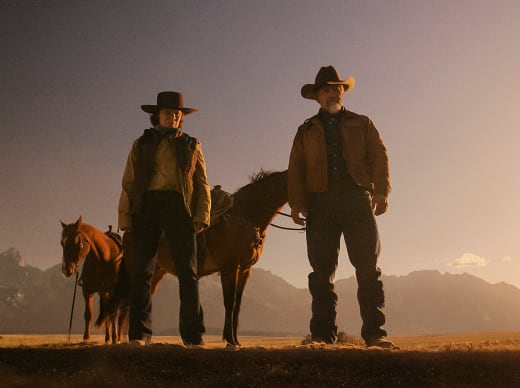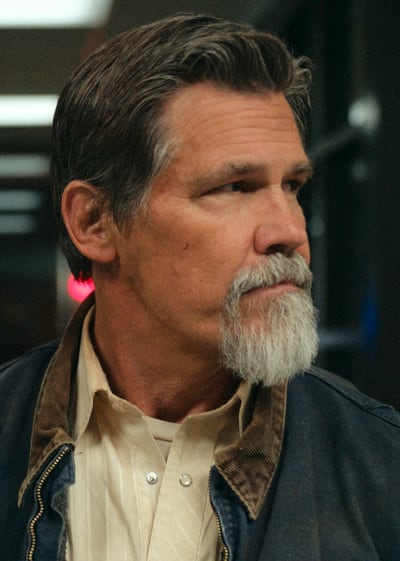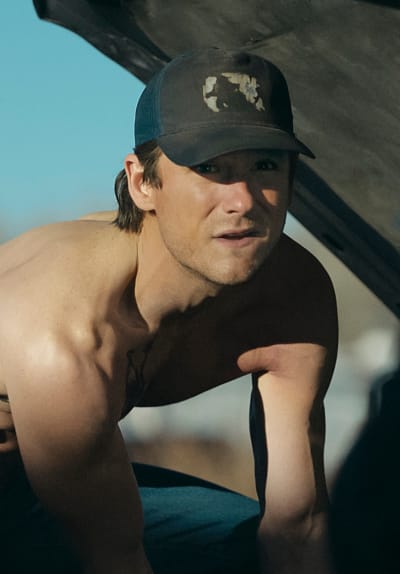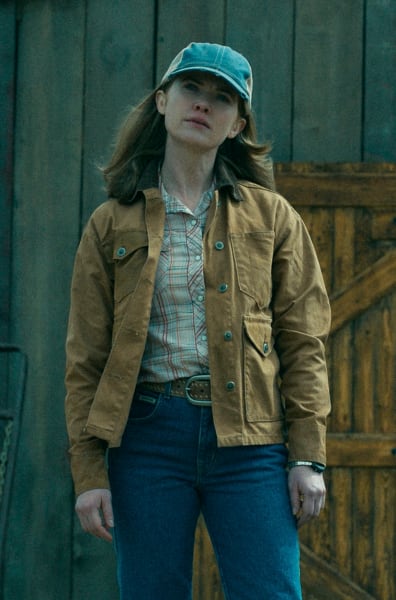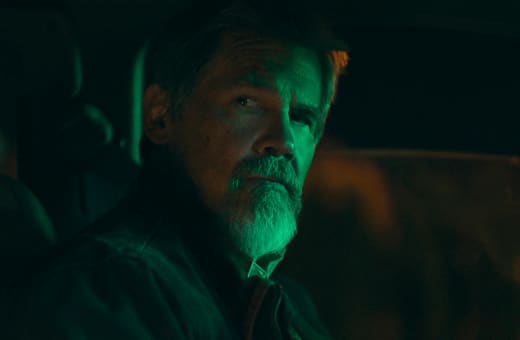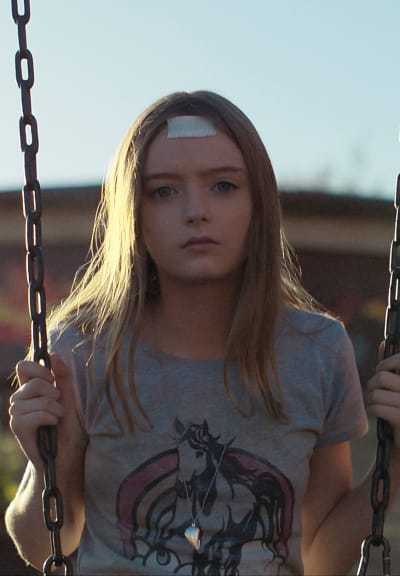These episodes begin with Rebecca, Amy’s scarcely-seen mother.
It’s nice to finally get a character moment with Rebecca, the catalyst behind Perry’s leap into the void of the mysterious circle, Cecilia’s breakdown, and the Abbot family’s struggles in court.
In fact, Perry Abbott’s absence resulted in a Notice of Forfeiture in court, resulting in a $500k payment levied against the Abbott estate, due in a few days. Failure means forfeiting the deed to their property.
Wayne Tillerson sits in the back of the courtroom, looming over it all despite his lack of responsibility over the morning’s proceedings.
He’s laughing it up for now, and the Abbotts’ distress is palpable.
Will Patton proves once again that he is perfect for this role.
The level of narcissism, overwhelming confidence, and witty dialogue he presents belie a troubled mind.
He believes he’s right for going after the west pasture, though you can’t help but feel the need to take a shower after a significant scene with Wayne Tillerson in it.
In the meantime, Autumn decides to become more involved in Cecilia’s church family, though Autumn/Amy is not there to sit quietly in a pew and socialize with her fellow churchgoers.
It seems as though Amy’s primary objective is to be as annoying as possible.
She has her points against the church, beyond a doubt, but the way she goes about it frames her as a petulant woman-child despite her ability to lead and cow the Tillerson brothers into following her.
In Season 1, we saw what happens when Autumn is off her meds, and Imogen Poots does an excellent job of presenting the audience with a character we are unsure of.
It feels as if she’s constantly on the verge, with an aura about her of command, instability, confusion, and certainty all at once.
She wants to one-up the church, especially the preacher, and then she returns to beg the church’s indulgence in paying off the Abbott’s half-a-million debt.
Most small-town churches probably couldn’t come up with a sum like that, at least not on short notice, but it ultimately just creates a lot of unnecessary friction.
Speaking of Autumn’s relationship with the Tillerson brothers, she’s able to get into the Tillerson home via her new connection to the church, as the congregation visits Billy in his in-home hospital bed.
She immediately does to Luke what she did to Billy.
She may struggle with getting the church to do what she wants, but Autumn is adept at drawing weak and wounded men into her aura, where they fall helplessly under her power.
The way she does this makes it difficult to determine her ultimate allegiance.
Is she just a grey moral character or the series’s true antagonist or protagonist?
The Tillerson home is where the best drama of the episode takes place, as Wayne calmly, with all the creepy foreshadowing Will Patton can muster, puts Luke in his place as the “middle child.”
Season 2, Episode 4 finally gives us an hour almost entirely dedicated to Joy and the Native Americans who lived on the land in the latter half of the 19th century.
Although Joy is the acting Sheriff, it doesn’t feel like she’s gotten much screen time, especially in the first three episodes of the second season. A
s far as Native American representation goes, this is their biggest showing thus far.
It helps the audience connect with the character and history of the land the Abbotts desperately want to keep and the Tillersons desperately want to take. But it comes with a caveat.
While Joy’s four-year stay in 1800s Wyoming provides us with a deeper and long-overdue dive into her character, it comes at the expense of the overall series.
There is so much going on in Outer Range, and this episode eats up valuable time.
It would have been better to include Joy more instead of dedicating an entire episode to her before returning to the status quo. It also feels a bit jarring and out of place.
Later, Joy mentions some of the stories of her people in relation to the black void in the west pasture.
Here’s to hoping we get more Joy and Native American lore interspersed with the other subplots going on.
It provides a more interesting, if unclear, answer regarding Royal’s first run-in with the mysterious black void.
As it turns out, he kills his father instead of killing Joy when he has the opportunity to do so under the heavy glower of his perpetually rage-filled, insipid dad.
Again, this brings up the question of whether or not present-day Royal is able to remember these things.
The indication is a no, thanks to Joy having to explain things to him later.
When it comes to playing with time travel on screen, the audience will find the holes, if any, and tear them apart.
When Joy is reunited with the present time, she’s aged four years, even though only a couple of days have passed since her disappearance.
The conversation between her and Royal is brief but telling.
He warns Joy not to lie to her wife, Martha.
Because I spent the last 50 years lying, to the world, to my family, and the first lie is the hardest. Then, it just gets easier, and my family is broken now because of it. Tell the truth, before it’s too late.
Royal Abbott
Only a moment later, Joy tells her deputy a false account of her disappearance.
The writers did a fantastic job with the ominous dialogue between Royal and Joy.
He knows the disaster that awaits the lies, and yet she’s falling into the same trap he did. Granted, she hasn’t spoken to her wife about it yet, so how this all plays out is speculative.
Tamara Podemski is effective at conveying the feelings and thoughts of Joy with nothing more than body language and facial expressions.
She’s on the ragged edge, lacking a full understanding, uncertain, yet determined.
Last but not least, Cecilia has a moment on the phone with Amy (the younger version
t would seem that Rebecca has turned Amy against the rest of the Abbott family.
This unravels a new spool of thread.
Several subplots cry out for a resolution with only two episodes remaining.
Whether or not Outer Range will close them or make us wait another two years remains to be seen.
In the meantime, the Amy/Autumn question has finally been answered for certainty.
A season and a half in, however, and Outer Range asks far more questions than it answers.
Outer Range continues to be an engaging mystery despite the potential for a few hiccups down the road.
The time travel elements are the most concerning, along with a better balance between secondary and primary characters.
The dialogue is better than average and truly excels in certain moments, while the atmosphere is spot on for this twisted Wyoming version of Twin Peaks.
Thomas Godwin is a staff writer for TV Fanatic. You can follow him on X

